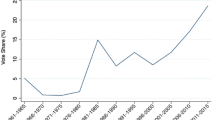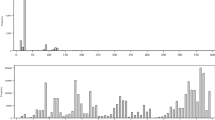Abstract
In this paper we analyze the relationship between ethnic polarization and the duration of civil wars. Several recent papers have argued that the uncertainty about the relative power of the contenders in a war will tend to increase its duration. In these models, uncertainty is directly related to the relative size of the contenders. We argue that the duration of civil wars increases the more polarized a society is. Uncertainty is not necessarily linked to the structure of the population but it could be traced back to the measurement of the size of the different groups in the society. Given a specific level of measurement error or uncertainty, more polarization implies lengthier wars. Our empirical results show that ethnically polarized countries have to endure longer civil wars than ethnically less polarized societies.
Similar content being viewed by others
References
Alexandre M (2005) Is poverty to blame for civil war? New evidence from nonlinear fixed effects estimation. Harvard University, Mimeo
Andersen P, Gill R (1982) Cox’s regression model for counting processes: a large sample study. Ann Stat 10(4): 1100–1120
Atlas NM (1964) Atlas of the people of the world. Moscow: Glavnoe Upravlenie Geodezii i Kartografii. Bruck, S.I., and V.S. Apenchenko (eds)
Bluedorn JC (2001) Can democracy help? growth and ethnic divisions. Econ Lett 70: 121–126
Box-Steffensmeier J, Zorn D (2003) Nonproportional hazards and event history analysis in international relationships. J Confl Resolut 47(1): 33–53
Caselli F, Coleman WJ (2006) On the theory of ethnic conflict. LSE, Mimeo
Collier P, Elliot V, Hegre H, Hoeffler A, Reynal-Querol M, Sambanis N (2003) Breaking the conflict trap: civil war and development policy. World Bank and Oxford University Press, Washington, DC
Collier P, Hoeffler A (2004) Greed and grievance in civil war. Oxf Econ Pap 56: 595–663
Collier P, Hoeffler A, Söderbom M (2004) On the duration of civil war. J Peace Res 41(3): 253–273
DeRouen K, Sobek D (2004) The dynamics of civil war duration and outcome. J Peace Res 41(3): 3003–3320
Duclos J, Esteban JM, Ray D (2004) Polarization: concept, measurement and estimation. Econometrica 74: 1737–1772
Esteban JM, Ray D (1994) On the measurement of polarization. Econometric, a 62(4)
Fearon J, Laitin D (2003) Ethnicity, insurgency, and civil war. Am Pol Sci Rev 97(1): 75–90
Fearon J (2004) Why do some wars last so much longer than others?. J Peace Res 41: 275–301
Fearon J (2005) Primary commodity exports and civil wars. J Confl Resolut 49(4): 483–507
Gates S, Strand H (2004) Modelling the duration of civil wars: measurement and estimation issues. Centre for the Study of Civil Wars PRIO, Mimeo
Gleditsch NP, Wallensteen P, Eriksson M, Sollenberg M, Strand H (2002) Armed conflict 1946–2001: a new dataset. J Peace Res 39(5): 615–637
Hegre H, Sambanis N (2006) Sensitivity analysis of empirical results on civil war onset. J Confl Resolut 50: 508–535
Horowitz D (1985) Ethnic groups in conflict. University of California Press, Berkeley, CA
Montalvo JG, Reynal-Querol M (2002). Why ethnic fractionalization? Polarization, Ethnic Conflt and Growth. UPF Working Paper 660
Montalvo JG, Reynal-Querol M (2005) Ethnic polarization, potential conflict and civil wars. Am Econ Rev 95(3): 796–816
Montalvo JG, Reynal-Querol M (2005) Ethnic diversity and economic development. J Dev Econ 76: 293–323
Posner DN (1999) Ethnic fractionalization in Africa. Mimeo
Powell R (2004) The inefficient use of power: costly conflict with complete information. Am Pol Sci Rev 98(2): 231–241
Powell R (2002) Bargaining theory and international conflict. Ann Rev Pol Sci 5: 1–30
Reynal-Querol M (1998) Growth and Religious Conflict. Universitat Pompeu Fabra, Mimeo
Reynal-Querol M (2001) Ethnic and religious conflict, political systems and growth. Dissertation, LSE, London
Reynal-Querol M (2002) Ethnicity, political systems, and civil wars. J Confl Resolut 46(1): 29–54
Slantchev BL (2003) The principle of convergence in wartime negotiations. Am Pol Sci Rev 97(4): 621–632
Slantchev BL (2004) How initiators end their wars: the duration of warfare and the terms of peace. Am J Pol Sci 48(4): 813–829
Smith A, Stam A (2004) Bargaining and the nature of war. J Confl Resolut 48(6): 783–813
Taylor C, Hudson MC (1972) The world handbook of political and social indicators. 2nd edn. Yale University Press, New Haven, CT
Vigdor JL (2002) Interpreting ethnic fragmentation effects. Econ Lett 75: 271–276
Wolfson MC (1994) When inequalities diverge. Am Econ Rev Pap Proc 84(2): 353–358
Author information
Authors and Affiliations
Corresponding author
Additional information
We thank two anonymous referees and the participants in several workshops. Montalvo holds the Prize ICREA Academia for excellence in research funded by the Generalitat de Catalunya. Reynal-Querol has received funding from the European Research Council under the European Community’s Seventh Framework Programme (FP7/2007-2013)/ERC grant agreement n. 203576. The authors acknowledge the financial support of the grant SEJ2007-64340 from the Spanish National Science Foundation. Both authors also acknowledge the support of the Barcelona GSE Research Network and the Government of Catalonia.
Rights and permissions
About this article
Cite this article
Montalvo, J.G., Reynal-Querol, M. Ethnic polarization and the duration of civil wars. Econ Gov 11, 123–143 (2010). https://doi.org/10.1007/s10101-010-0077-8
Received:
Accepted:
Published:
Issue Date:
DOI: https://doi.org/10.1007/s10101-010-0077-8




